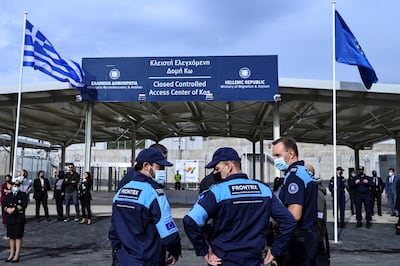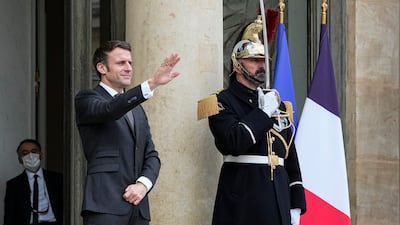An EU citizens’ panel championed by French President Emmanuel Macron has issued 40 recommendations for the future of the bloc’s foreign and migration policy, but stopped short of calling for a full-scale European army.
The panel also rejected a disputed suggestion that immigration quotas should cap the share of foreigners in EU neighbourhoods at 30 per cent.
But it called for a migration overhaul that would force countries to take in a fair share of asylum seekers and create EU-mandated language and integration courses.
It called for more powers for EU border agency Frontex so that it could intervene in any member state to protect the bloc’s frontiers.
The proposals come as Mr Macron tries to use his country’s six-month presidency of the EU to drive forward long-stalled immigration reforms and sell his vision of greater European sovereignty.
The panel of 200 EU citizens, one of four such committees addressing different topics, is part of an initiative called the Conference on the Future of Europe which was spearheaded by Mr Macron.
It was launched last year with the aim of providing tangible proposals that could be taken forward this year by the French presidency.
In a final session in Maastricht, the migration panel struck out six proposals from its list including a call for a joint army that would involve the “gradual integration and subsequent conversion of national armed forces”.
However, it left in a recommendation that a joint military force could provide help after natural disasters and be sent abroad in exceptional cases.
Mr Macron has led calls for greater European independence in defence matters, but some EU members are wary of watering down Nato’s role. The bloc has had a reserve of “battle groups” since 2007 but never used them.

On migration, the panel said Europe’s labour market should be more open to asylum seekers to encourage them to integrate in their new countries.
Refugees should receive free of cost, but compulsory, language training starting within two weeks of a residency application being filed, EU leaders were told.
The panel called for asylum rules to be replaced with a legally-binding treaty requiring a “just, balanced and proportionate” distribution of asylum seekers.
Countries on Europe’s external border such as Italy and Greece have long complained that they face an excessive burden from illegal migration.
But efforts to reform these rules have been at a stalemate for years, with Mr Macron hoping to launch a new reform push for the border-free Schengen zone.
Another rejected proposal was the idea that no neighbourhood should draw more than 30 per cent of its inhabitants from non-EU countries.
The proposal was inspired by a move in Denmark to limit the number of “non-western” residents to the same threshold, although the government there removed the provocative word “ghetto” from its legislation.
Supporters of such a quota lost the argument in the EU panel after claiming that it would lead to greater acceptance of migrants by the local population.


